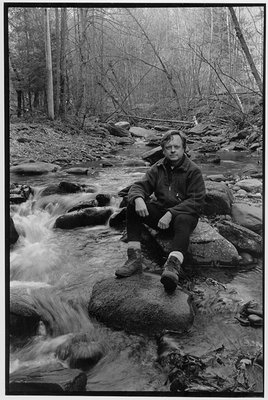Long before Hoboken was today’s mile-square city, some locals, like former resident and poet Will Nixon, referred to the small town on the Hudson River as the City of Grudges.
His new book of poetry called “Love in the City of Grudges” brings 1980s Hoboken back to life by weaving a fictional story behind the old signs of famous landmarks that still line the city’s rooftops.
The semi-autobiographical work recounts some of the author’s most vivid memories of Hoboken, including long nights at Maxwell’s rock bar and the infamous arson fires, which he witnessed when he lived above the Clam Broth House restaurant on Newark Street.
“For me, Hoboken was the first time I ever lived in a real urban area,” Nixon said. “It was a thrilling shock. There was a bank across the street on Newark with a sign that said: ‘Live fast and die out of town.’ ”
“Gentrification wasn’t even a word at that time.” – Will Nixon
________
“He used to walk around town with a blow horn barking at people,” Nixon said. Although the author moved here from the relatively quiet streets of suburban Connecticut, he didn’t think of Hoboken as a particularly dangerous place to live.
“I never felt like I’d get mugged,” he said. “It felt safe. Everything was run down, but there weren’t really dangerous people. Everyone knew each other.”
For Nixon, Hoboken still had that “small-town feeling.” “Gentrification wasn’t even a word at that time,” he said. “The waterfront was an old ruin. And then there were the fires.”
Let it burn
According to Nixon, who wrote for the Hudson Reporter at the time, the infamous arson fires of the ’80s were mostly set on the top floor of the buildings so the interior of the building would be completely water damaged, but the surrounding structure remained unharmed. Developers would remodel the interior and turn huge profits.
He writes in his poem Arson Done Right: “Fresh from Maxwell’s with guitars still ringing in my ears & somebody’s beer on my sleeve, I saw it all from my [street] corner: the fire contained to the top floor of the welfare hotel like campfires along cornices.”
Although Nixon admits the danger, he said there was never any great panic.
“It’s funny, I was never worried about my building burning,” Nixon said, “but I watched the others burn.”
The poet’s muse
Nixon’s work has been nominated for a Pushcart Prize and listed in Best American Essays 2004. “Love in the City of Grudges” is dedicated to the author’s two muses Thanatos and Eros, mythical Greek characters representing the themes of death and love, which the poet stumbled upon while reading the works of Sigmund Freud. “Eros is a connection or a coming together,” he said, “which is just a part of urban life when you’re young; while Thanatos is a decaying or disillusion – things falling apart. The character sees both of these throughout the book.”
For the author, who now lives in Woodstock, N.Y., reliving his younger years was an important part of understanding the time. “I stared having these really vivid memories of living in Hoboken and being a prisoner to brick and concrete,” he said about writing the collection. “Here I am living in this beautiful green paradise and writing about cockroaches in Hoboken.”
What does he take away his time spent here?
“I can finally appreciate that time in my life,” he said, “and see that I was struggling a lot more than I knew.”
To purchase the book online or for more information about Will Nixon, go to: www.willnixon.com.
Sean Allocca can be reached at editorial@hudsonreporter.com
